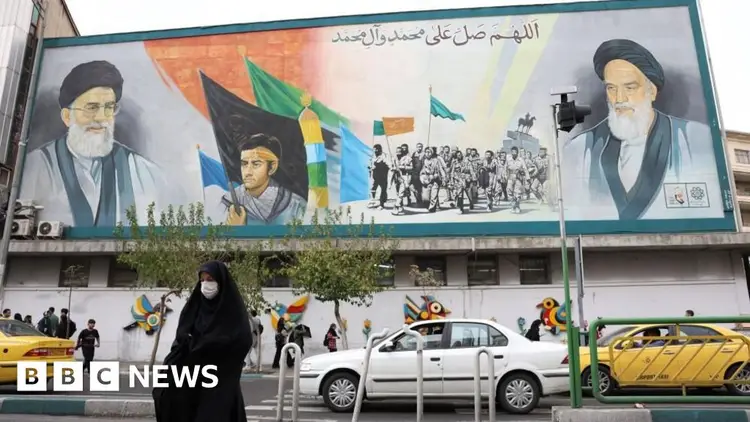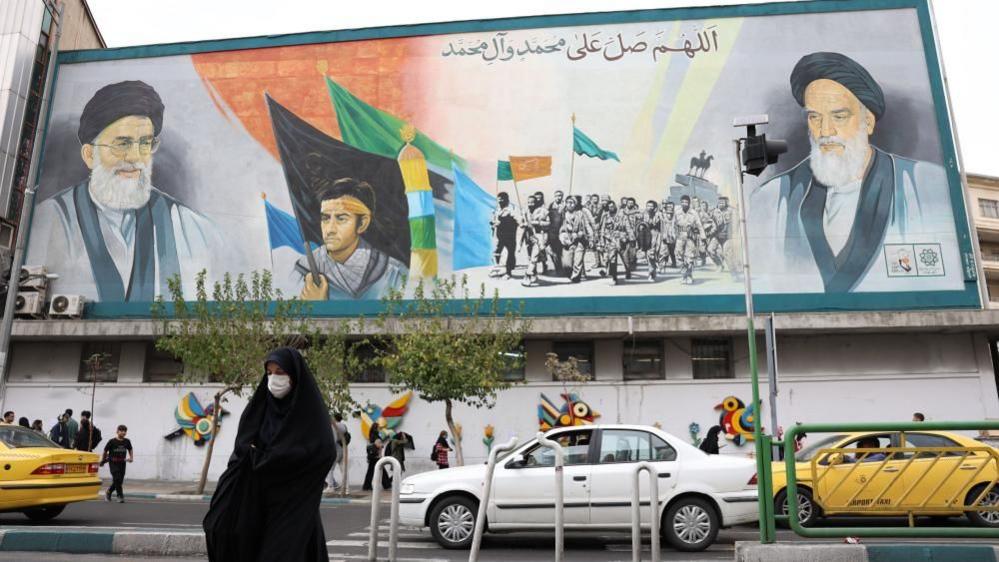Jeremy Bowen: Iran faces hard choices between risks of escalation or looking weak

Israel's assault on Iran escalates the conflict in the Middle East. Central to the choices made by Iran's supreme leader, Ayatollah Ali Khamenei, and his main advisors is the need to prevent or manage an even greater escalation.

They have to choose the option that is the least unfavorable from a range of tough alternatives. On one side, there's the possibility of launching another attack using ballistic missiles. Israel has already warned that it will respond again if that takes place.
On the flip side, there is the choice to put an end to the harmful back-and-forth of direct attacks on their territories. If Iran chooses to remain calm, it could be perceived as weak, scared, and influenced by Israel's military strength and political resolve, which is also supported by the United States.
Ultimately, the highest authority and his advisors will probably choose the option they believe poses the least risk to the continuation of Iran's Islamic government.
In the moments leading up to and following Israel's strikes, Iranian state media broadcast bold declarations that seem to indicate a pre-determined choice to retaliate. Their rhetoric mirrors that of Israel, emphasizing their right to defend against aggression. However, given the gravity of the situation, Iran might choose to reconsider its threats.
This is what Prime Minister Sir Keir Starmer of Britain is hoping for, as he supports the United States' view that Israel's actions were taken in self-defense.
"I firmly believe that Israel has the right to protect itself from Iranian threats," he stated. "At the same time, it's important that we prevent any further escalation in the region, and I call on everyone involved to exercise caution. Iran should refrain from retaliating."
Iran has maintained a steady stance since its ballistic missile strike on Israel on October 1. Just last week, Iran’s Foreign Minister Abbas Araghchi mentioned in an interview with Turkey’s NTV that "any aggression against Iran will be viewed as a serious violation for us. We will respond to such an act."
Just hours before the Israeli attacks, Iranian Foreign Ministry spokesperson Esmail Baqai declared, "Any act of aggression from the Israeli government toward Iran will be confronted with overwhelming strength." He also stated that it was "extremely deceptive and unfounded" to imply that Iran would not retaliate against a minor Israeli assault.
While Israeli planes were returning to their base, Iran's foreign ministry referenced its right to self-defense, as outlined in Article 51 of the UN Charter. In a statement, Iran expressed that it felt both justified and obligated to counter foreign acts of aggression.
Since the spring, Israel has been leading the way in rising tensions. It identifies Iran as the main supporter behind the Hamas attacks that resulted in the deaths of around 1,200 individuals, including both Israelis and over 70 foreign nationals, on October 7 of last year. Worried that Israel might be seeking an opportunity to launch an attack, Iran has consistently indicated that it does not wish to engage in a full-scale war with Israel.
This didn't imply that it was ready to ease up on its ongoing, frequently lethal, yet less intense pressure on Israel and its partners.
The leaders in Tehran believed they had a more strategic approach than escalating into full-scale war. Rather than direct conflict, Iran deployed its allies and proxy groups as part of what it calls the "axis of resistance" to launch attacks on Israel. In Yemen, the Houthis targeted and disrupted maritime traffic in the Red Sea, while Hezbollah’s rocket attacks from Lebanon drove at least 60,000 Israelis to evacuate their homes.
Half a year into the conflict, Israel's response led to the displacement of possibly double the number of Lebanese residents in the southern region. However, Israel was ready to escalate its actions significantly. They issued a warning that if Hezbollah continued its attacks against Israel and did not retreat from the border, they would take further measures.
When this didn't occur, Israel made the decision to escape from a conflict that had been influenced by Iran's ongoing, albeit restricted, warfare. It delivered a series of significant strikes that unsettled the Islamic regime in Tehran and disrupted its plans. This is the reason why, following the most recent attacks by Israel, Iranian leaders are now faced with difficult options.
Israel saw Iran’s hesitance to engage in a full-scale war as a sign of vulnerability and increased its pressure on Iran and its allies. Prime Minister Benjamin Netanyahu and Israel’s military leaders felt emboldened to take chances, thanks to the strong backing of President Joe Biden. This support included not only large shipments of weapons but also the deployment of substantial American naval and air forces to the region, reinforcing the US commitment to protect Israel.
On April 1, an Israeli airstrike targeted and damaged a section of Iran’s diplomatic facility in Damascus, the capital of Syria. The attack resulted in the death of a high-ranking Iranian officer, Brigadier General Mohammed Reza Zahedi, along with several other senior members of Iran’s Islamic Revolutionary Guard Corps (IRGC).
The Americans were angry that they hadn't received a heads-up and enough time to prepare their own troops. Nevertheless, Joe Biden remained steadfast in his support as Israel dealt with the fallout from its actions. On April 13, Iran launched an attack using drones and various types of missiles. While many of these were intercepted by Israel's defense systems, they also received significant assistance from the military forces of the US, UK, France, and Jordan.
Biden reportedly urged Israel to "secure the victory," believing this could help de-escalate what had turned into a critical situation in the expanding conflict in the Middle East. When Israel limited its retaliation to attacking a missile defense installation, it appeared that Biden's strategy was proving effective.
Approximately 1,200 individuals lost their lives during the Hamas assault on Israel on October 7.
Since the summer, Israel has consistently intensified its conflict with Iran and its network of allies and proxies. The most significant strikes were directed at Hezbollah in Lebanon, Iran's most crucial partner. For years, Iran has been strengthening Hezbollah's stockpile of weapons as a vital component of its defense strategy. The underlying strategy was to discourage any Israeli assault on Iran, knowing that Hezbollah would retaliate against Israel from just across the border in Lebanon.
However, Israel took the initiative, putting into action strategies it had created since Hezbollah managed to hold them off in the 2006 conflict. They detonated explosives hidden in pagers and walkie-talkies that they had tricked Hezbollah into purchasing, launched an invasion into southern Lebanon, and eliminated Hezbollah's leader, Sheikh Hasan Nasrallah, who had long been a symbol of resistance against Israel. Authorities in Beirut report that Israel's offensive in Lebanon has resulted in over 2,500 deaths, displaced more than 1.2 million people, and inflicted significant destruction on a nation that was already struggling due to a severely weakened economy.
Hezbollah continues to engage in combat and target Israeli soldiers within Lebanon, launching numerous rockets in the process. However, the group is struggling following the loss of its leader and a significant portion of its weaponry.
Confronted with the imminent failure of its strategy, Iran realized it needed to retaliate. Letting its allies engage in battle and suffer losses without taking action would undermine its status as the leader of the anti-Israel and anti-Western movements in the area. As a response, it launched a significantly larger ballistic missile attack on Israel on October 1.
The airstrikes that occurred on Friday, October 25, were Israel's reaction. They took more time to happen than many anticipated. Possible leaks regarding Israel's strategies might have played a role in this delay.
Israel is conducting a significant military operation in northern Gaza. The United Nations human rights commissioner, Volker Turk, has described this period as the most tragic in the ongoing conflict in Gaza. He has condemned the Israeli forces for subjecting the entire population to relentless bombing, blockades, and the threat of famine.
An outsider can't really determine if Israel's attacks on Iran were planned to divert global attention from northern Gaza. However, it is possible that this could have been a factor in their strategy.
On October 1, Israel's Iron Dome missile defense system successfully shot down the majority of missiles launched from Iran.
Breaking The Cycle Of Escalation
It can be difficult to break the cycle of ongoing strikes and retaliations when the nations involved fear that not responding would make them appear weak or vulnerable. This mindset can lead to a situation where conflicts escalate unchecked.
The pressing issue now is whether Iran is willing to allow Israel to have the final say, at least for this phase of the conflict. President Biden supported Israel's response following the events of October 1. However, he once more sought to prevent a more catastrophic escalation by publicly advising Israel against targeting Iran's crucial infrastructure, such as its nuclear, oil, and gas facilities. To bolster Israel's defenses, he deployed the THAAD missile defense system, and Prime Minister Netanyahu consented to follow his recommendations.
The upcoming American elections on November 5 are influencing the strategies of both Israel and Iran regarding future developments. Should Donald Trump secure a second term, he may be more willing than Biden to respond to any Iranian retaliation with military action targeting nuclear, oil, and gas sites.
The Middle East finds itself in suspense once more. Israel's choice to refrain from targeting Iran's key assets could potentially allow Tehran to delay a reaction, giving diplomats a bit more time to operate. During last month's UN General Assembly, Iranian officials hinted at a willingness to engage in fresh talks regarding nuclear matters.
This is important for the international community beyond the Middle East. Iran has consistently claimed that it does not seek nuclear weapons. However, its advancements in nuclear technology and uranium enrichment suggest that it could easily obtain one. Iranian officials are likely exploring new strategies to protect themselves against adversaries, and creating a nuclear warhead for their ballistic missiles could be part of their plans.









































